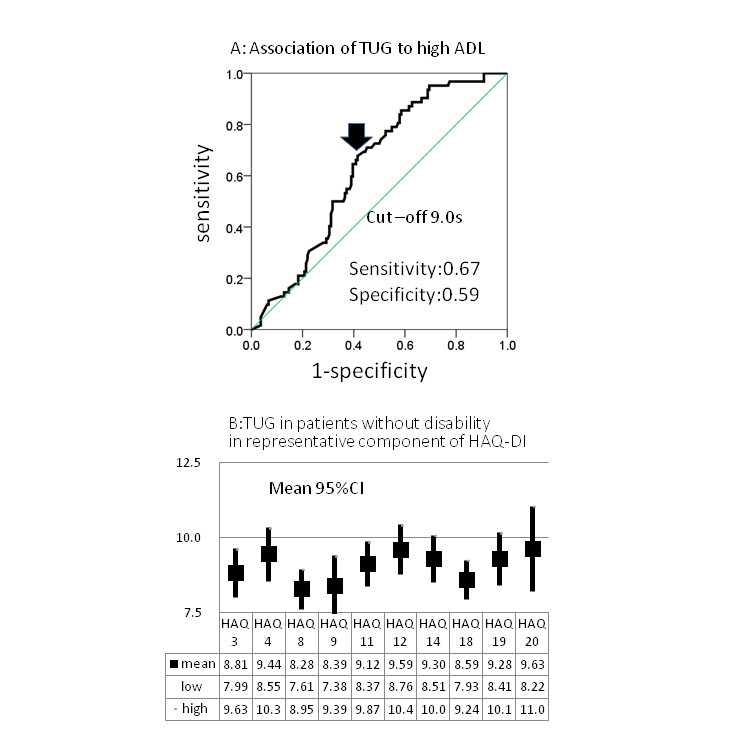Session Information
Session Type: ACR Poster Session C
Session Time: 9:00AM-11:00AM
Background/Purpose:
Total management
including reconstructive joint surgery and rehabilitation should be needed for
further improvements of physical function for long-standing RA patients. It is
very important to set treatment goal for those management using index of
activity speed [Time Up and Go (TUG)] and range of motion (ROM). The purpose of
this study is to explore the characteristics of functional impairment and
relationship TUG and physical function in RA patients who were needed joint
surgery using multicenter prospective cohort.
Methods:
We started the prospective study in September, 2012
(Study registration: UMIN000012649). We collected data at pre- and
post-operation (0.5 years, 1 year) on age, sex, disease duration, drug
therapies, and disease activity. Functional evaluations were made using the TUG,
HAQ-DI, DASH (upper limb function), and patient subjective evaluations using
the EQ-5D (QOL) and BDI-II (depression). Joint range of motion was also measured
as part of this evaluation.
Results:
347 surgical patients were registered. Mean values
for age, disease duration, and sex were 65.2 years, 18 years, and 88% female,
respectively. Actually, even
long-standing RA patients who were needed joint surgery had remission or low
disease activity in this baseline data (median values for DAS28 (3.0) and CRP
(0.33 mg/dl). 23.8% of the patients were treated with biologics. We confirmed the significant
correlation between TUG and disease duration, HAQ-DI, patient-reported outcome
(EQ-5D, BDI-II ) and range of motion (hip, knee,
shoulder ankle). We also found significant relationship between TUG and the
level of disability in 18 of 20 components in HAQ-DI. TUG was significantly associated with
high ADL status (total HAQ point <6/60: upper quartile value of study
population) based on ROC curve (Fig. A). Cut-off value of TUG for high ADL
status was 8.98 seconds (sensitivity 67%, specificity 59%).Cut-off of TUG (9
seconds) was associated with the TUG value of patients without disability of
HAQ-DI component (Fig.B). As for total knee and hip
arthroplasty, TUG was significantly improved after operation (14.0 s to 11.1
s). TUG before operation significantly associated with that after operation. To
achieve TUG=9 seconds after operation, the cut-off of TUG before operation was 10.3
s (sensitivity 74%, specificity 82%).
Conclusion:
TUG
was significantly associated with many kinds of daily activity and
patient-reported outcome. The information should be important for assessment of
disability in patients with long-standing RA. TUG as shown in this study could provide
target of surgical procedure and rehabilitation program and index of timing for
better outcome of joint arthroplasty.
To cite this abstract in AMA style:
Kojima T, Ishikawa H, Nishida K, Tanaka S, Haga N, Hashimoto J, Miyahara H, Niki Y, Kojima M, Ishiguro N. Relationship Between Index of Activity Speed (Time Up and Go test) and Patient-Reported Outcome in Patients with Long-Standing Rheumatoid Arthritis: Multicenter Prospective Cohort Study for Evaluation of Joint Surgery on Physical Function [abstract]. Arthritis Rheumatol. 2015; 67 (suppl 10). https://acrabstracts.org/abstract/relationship-between-index-of-activity-speed-time-up-and-go-test-and-patient-reported-outcome-in-patients-with-long-standing-rheumatoid-arthritis-multicenter-prospective-cohort-study-for-evaluation/. Accessed .« Back to 2015 ACR/ARHP Annual Meeting
ACR Meeting Abstracts - https://acrabstracts.org/abstract/relationship-between-index-of-activity-speed-time-up-and-go-test-and-patient-reported-outcome-in-patients-with-long-standing-rheumatoid-arthritis-multicenter-prospective-cohort-study-for-evaluation/

